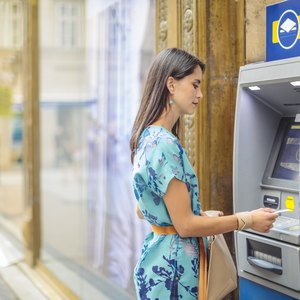
With more than 400,000 ATMs in the U.S. alone, you're never far from accessing the cash in your bank account. These handy machines make it so you don't have to carry around large amounts of cash, which is much safer. Whether you use the ATM in your bank lobby, local supermarket or gas station convenience store, you need to be careful not to leave the debit card behind after you complete your transaction. If this does happen though, you'll want to act fast.
Tips
According to the American Bar Association, cards that are left in the traditional ATMs are pulled back into the machine, where they will remain until morning. If you've left your debit card in the machine, you should act fast and call the bank, cancel or place a hold on the card, and keep a close eye on your transactions.
Types of ATM Machines
There are two types of ATM machines. The first is a slide reader. Since this ATM requires you to swipe your card through the reader, either on the side of the machine or quickly in and out the bottom of the machine, it's less likely that you'll forget the debit card. The card never leaves your hand unless you set it down next to the machine when continuing with the cash withdrawal. The second is the more traditional ATM that pulls your debit card into the machine. The debit card remains in the machine until the transaction is complete and then it is promptly ejected. With this type, you may forget to grab the card from the machine, or the machine may neglect to eject the card.
Cards Left in the Machine
According to the American Bar Association, cards that are left in the traditional ATMs are pulled back into the machine, where they will remain until morning. The bank employee who removes the card may set it aside to see if someone claims it, shred it and throw it away or send it to their central office.
Call the Bank
As soon as you notice that you left your debit card in the ATM, call the bank or store where the ATM is located. Ask if someone turned the card in, and if not, have them check the machine. If they have the card, you can go pick it up. If it was sent to the company's central office, request the address and phone number, so you can arrange to get the debit card back.
Contact the Card Issuer
In the event that your card was shredded or never found, you need to contact the issuer of the debit card. Report the card as lost and have the company cancel the card and issue a new one. This is the best course of action, as it will protect you from fraud in the event that someone finds your card and tries to use it.
Check Your Transaction History
Once you've cancelled your old card or retrieved it from the ATM location, you'll want to do a quick check of your account's transaction history. Look for any charges that were made during the time the card was not in your possession. If you spot any, inform the financial institution immediately and dispute the charges.
References
- American Bar Association: Automatic Teller Machines (ATMs) and the Law
- eCheck: What to do if the ATM Eats Your Card?
- Clever Dude: What Happens If You Forget Your Debit Card In An ATM?
- TransferWise: ATMs in the United States
- American Bar Association. "Automatic Teller Machines (ATMs) and the Law." Accessed March 24, 2020.
- CVV Number. "What Is My CVV Number and How Do I Find It?" Accessed March 24, 2020.
- Huntington National Bank. "How to Use a Debit Card: Online, ATM & Chip." Accessed March 24, 2020.
- Consumer Financial Protection Bureau. "What Is the Difference Between a Prepaid Card, a Credit Card, and a Debit Card?" Accessed March 24, 2020.
- Visa. "Visa Prepaid Reloadable Personal Cards." Accessed March 24, 2020.
- Consumer Financial Protection Bureau. "Understand the Fees You Will Pay." Accessed March 24, 2020.
- Federal Trade Commission. "Lost or Stolen Credit, ATM, and Debit Cards." Accessed March 24, 2020.
- Consumer Financial Protection Bureau. "What Is a Grace Period for a Credit Card?" Accessed March 24, 2020.
Writer Bio
Alicia Bodine is a New Jersey-based writer specializing in finance. With more than 13 years of experience, her work has appeared in LendingTree, GoBankingRates, Sapling, Zacks and budgeting.thenest.com.
